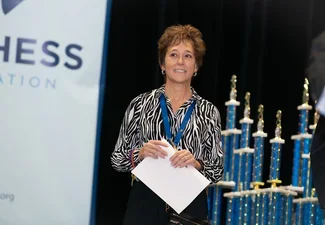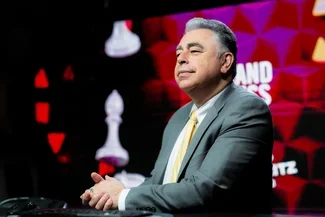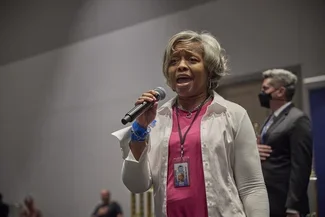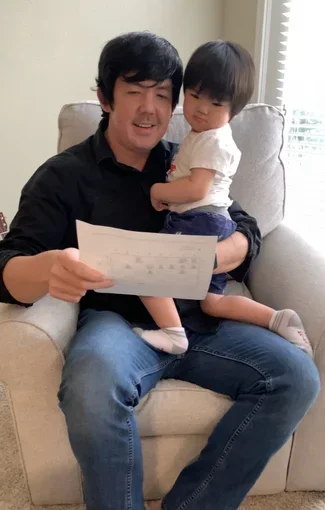Mark Indermaur, Co-Chair of the Chess in Education Committee, talks about Safe Play at US Chess, youth sports, and scouting:
(Starts at 07:22)

"I’ve had the privilege of working with a lot of directors and players over the past 19 years. It has been an exciting journey directing tournaments of all levels and sizes! Unfortunately, in our chess community, we have had some incidents that have occurred that we've have to face and find ways to overcome. These types of incidents can never be allowed to happen again. It’s going to take time and it’s not going to be easy. But I think US Chess has taken some good first steps with the SafeSport training and putting key people in positions to deal with anything like this going forward. Every single person in the chess community needs to take this seriously. I am hopeful that the SafeSport training will continue to evolve over time to meet our exact needs!
"
— Karen Pennock, NTD, IA
Photo by Caroline King

"The e-mail blast from Saint Louis Chess Club’s Executive Director, Tony Rich, seemed to be directed at everyone. But was it also really meant for me? The message requested that I pass a SafeSport online training. Moi? A lowly chess commentator? Why would I have to pass a SafeSport training? I’m no longer an athlete nor a coach — heck, I’m not even allowed into a playing hall. I wrote back to Tony asking for confirmation. Yep, as an employee of the Club, I, too, was required to be certified.
At that point I went through several stages all at once: Anger, resentment, outrage, acceptance, and finally, genuine interest.
I was told the training would last for 90 minutes. Not even close. Three hours was more like it. And much to my great surprise, I loved it! The training had “modules” that presented a scenario; I’d be asked about six questions beforehand, five of which I habitually got right. Invariably, I’d fail one, be annoyed, and then learn why my answer “might” have been wrong. (As you can guess, I didn’t always agree with the training!) Despite my misgivings, I learned a huge amount regarding … cyber-bullying. I completely missed the whole social media craze —just not my cup of tea — so I was utterly clueless. Now I was aghast by the things that athletes had to put up with. It was a real revelation. I took a lot of notes and carefully considered my answers as well as the scenarios presented as I went through the modules. A lot of careful thought and planning went into the training, and I found myself considering a variety of responses.
In the end? I’m very happy that I went through the training.
"
— GM Yasser Seirawan, chief commentator and spokesperson for the Saint Louis Chess Club
Austin Fuller, courtesy SLCC

"I think that SafeSport training is necessary. It’s vital. It’s important. It gives me as the adult — the coach, the parent, the educator — the opportunity to show that I’m a person someone can come to if they have any concerns. The little nuances in the SafeSport scenarios helped me understand that bullying or harassment is not simple. Sometimes I realized “I didn’t think about it like that,” even though I have 25 plus years of education and training and I’ve taken other trainings to be vetted for our school district.
I do like that you can apply the training everywhere. It’s not just for sports or for chess. It applies to other interactions that can occur: student to student or student to adults. And as a mom, I want my child or nieces or nephews or any of the children that I teach to be able to come to someone who has had a training like this.
"
— Ursula Byrd, Detroit area coach and Chess in Education committee member
Photo by Caroline King

"I support SafeSport training and the goals US Chess is trying to achieve. Even though I’ve taken similar classes, like VIRTUS to teach in Catholic schools and safety classes to teach in private schools, I didn’t expect to learn as much as I did.
I think it’s great to have tournament directors get this training. It also occurred to me that when I was growing up, I don’t think my coaches in chess or other sports had the opportunity to take a similar course. So I think SafeSport training for chess coaches would be helpful as well.
I was in an excellent mood after finishing the SafeSport training. I thought it was pretty cool to be taking the same training that Olympic coaches are doing. I felt a bit like a deputy for justice!
Panda Chess Academy values are Safety, Sportsmanship, and Focus, so I’m totally on board with SafeSport training.
"
— Jeffrey Ashton, National Master; Owner, Panda Chess Academy; 2020 US Chess meritorious service award winner
Photo courtesy of Edna Ashton








